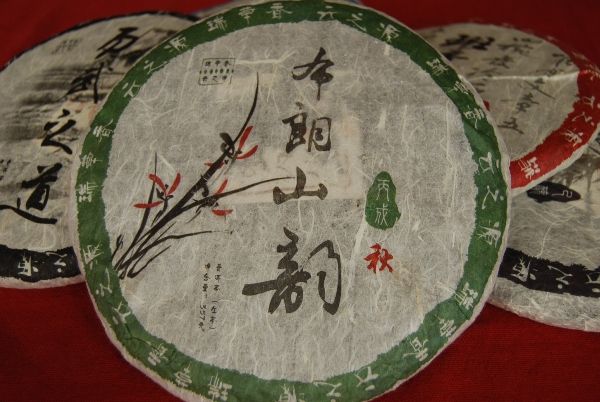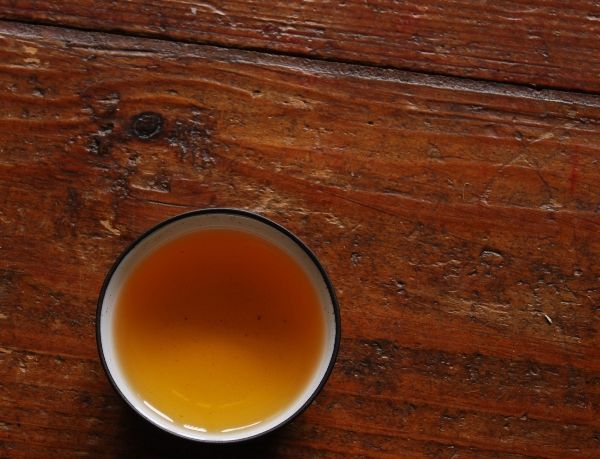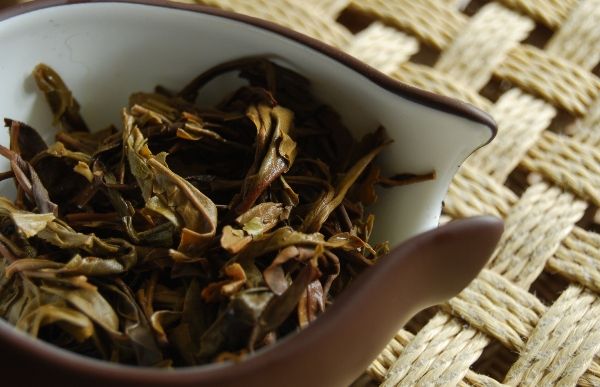"Gamma" is the "Bulangshanyun", which by coincidence or design is the same name as the dreadful "Bulangshanyun" from Puerh Shop that I lamented a few days ago. Yunnan Sourcing notes that this cake was made from 2006 maocha from Mannonzhai [winding-lane village], near Hekai, some 20km north of Banzhang.
Everyone I've seen so far has putting "gamma" at the end of the list (alpha, beta, delta, epsilon, gamma), but as it is the third letter in the Greek alphabet, I am going to insist upon correctness! Don't say you never learn anything from the Half-Dipper.
The leaves look a little older than the other cakes, which were super-fresh 2009 leaves. These Bulang leaves are quiet, a touch mellowed. As shown below, the soup is already orange - certainly more orange than aging for three years should provide, and so we suspect some pre-oxidation, wulong-style. The aroma is largely invisible - there is some tangible compound being emitted, but it has no detectable scent.
It is a simple tea, but smooth enough for me on a busy morning. I find that it has a creamy ending in the throat, emphasised by the somewhat creamy water that our tetsubin delivers, and this reminds me of the little 2008 Douji "Dadou" and "Shangdou" bricks, which are almost milky.
This tea is the second-cheapest in the range of five cakes, at $25. I enjoyed it, but be aware that you're not buying fresh, green shengpu - rather it has been aged in a sub-optimal environment, and possibly processed in an imperfect manner. A simple tea, and while I enjoyed it well enough, I would not count it as one of my favourites among the five in the tasting event. Its processing and aging would prevent me from buying it for storage.





20 comments:
Again, My notes are here http://puerhcollection.blogspot.com/2009/09/tea-tasting-event-half-dipper-ys.html
I'm actually ok with the age, I like having a headstart eg.3yrs ahead in this case. Afterall time is money but in this case it hasn't transformed enough to impress me.
It's certainly smooth but would prefer it to have a more expressive aroma and a better huigan. This could be a result of not pressing the maocha right away.
Not a weak pu though for those who like a cup after a heavy meal.
I like a headstart on age too - but I'm not sure about the conditions that this one has enjoyed. :)
Toodlepip,
Hobbes
True Hobbes, it is certainly a contributing factor to the final product.
I kinda liked Gamma. Full round flavors, sweet, malt and dates. Full round flavors with no sharp edges. Reminds me of shu minus the funk.
Special about the leaves are the long stems.
They smell deep-sweet like dried raisins. The taste misses this promise of sweetness, there is just a bit of it. Bitterness is dominating but it's not overwhelming. I love a shot of bitterness in teas and this tea has some mellowness which prevents astringence. As I have sipped this tea I got confused by its flavor. The main characteristic for me was the impression that the flavor went missing. Like the taste of once rich smelling herbs which have lost their aroma over the time of some hot summers. But after the first confusion about this I actually liked it. This tea had some emotional impact on me; it was down-to-earth and a bit melancholic. A nice calming effect.
I posted my comments before reading yours. Now I have read them and want to add: I also had the impression, this tea tastes older than its actual age for a sheng pu'er and I too had the impression of a slight similarity to shu pu'er in taste.
Best wishes,
Robert
Gamma:
Much darker leaves than alpha or beta (I think beta was lightest so far). Darker aroma from the dry leaves as well.
10s rinse: Darker and mustier rinse water.
5s: Soup is very orange compared to the others so far. Very mellow and somewhat bland.
7s: Orange soup. Some minor bitterness. Not much else in the way of flavor. Maybe a bit of wood but not much.
15s: Much more bitter now. Empty cup smells ever so slightly of baked apples without the sweetness. Soup is orange and flavors muddy. Not crisp.
20s: More bitterness and less flavor.
25s: The decline has started. From here on out we quickly lose all the flavors and bitterness. The liquor stays soft and dark but little else remains.
Nothing to see here, unfortunately. Nice mouthfeel but little else to recommend it. I don't think I'd pay for this. Is this a bulang? It's got the ku but seems to lack the rest and I used almost 9g!
One posted the 'Delta' notes... you got me.
Anyways the notes for the 'gamma' will come in a few days.
The gamma was interesting because it showed tell tale signs of age which was apparent in its taste, colour, and smell.
One enjoyed its aged malty mellow tones, its changing mouthfeel from syrupy velvet to thin.
This tea seemed to almost lack qi. What was there seemed to just fumble in the background.
Peace
Gamma:
My utterance upon opening the bag was “Oh, dear.” Greeted by a
weakly sweet hay-like aroma, my expectations plummet. The tea
looks nice enough, though, with medium size leaves, mostly intact
in a lightly compressed chunk of beeng. A light and grainy
sweetness in the wenxiangbei intensifies a little and lasts
longer than expected. The soup, too, is a rather deep shade of
amber. A rich silk coats the lips and tip of the tongue, but
when it parts, what’s left behind is a distinctly metallic
aftertaste, and no aroma nor flavor whatsoever. Unfortunately, I think my expectations are going to bear out here. The metallic
taste is where the ku should be.
I was very surprised that my first impression was that this reminded me of shupu.
Here is a link to the full Bu Lang tasting notes on MattCha's Blog:
http://mattchasblog.blogspot.com/2009/09/yunnan-sourcing-mystery-sample-gamma.html
Peace
Thanks for the notes, everyone.
Toodlepip,
Hobbes
New to Chinese tea and new to Pu-erh, I have little to compare with or judge by. I ordered the 5 samples kit to get a bit of a spread in these types of tea. I just struck gold when you lot decided to make this a world wide tasting event. A chance to learn... I have not tasted the others yet, as my set did not came marked Alpha, Beta and so on. I started with this one because I also ordered a cake of this one (moderate price, made from slightly older tea, I was hoping for a 'drink now' tea).
So far I have not been disapointed, in fact this tea is the best I have had up till now(one mysterious cake called 'Yunnan Chitsu', a sample of 'Star of Bulang', and some rather vile loose Pu-erh from a local chinese food store).
The smell of this tea in the warm pot is a lot more pronounced then what lingers in the sniffing cup, and reminds me of wet soil in a pleasant way. Nice for the season, as fall is just starting in the Netherlands. The taste is not very strong but nice, warm and slightly better during the first few brews, and gets sweeter and even softer later on. It seems I can brew this twea for longer then I did. I started out with 4 grams in a 100 ml pot, and the first 10 second brew after 2 rinces was slightly weaker then I think it should be. So I upped the second brew to 30 seconds. The outcome was more like what see in Half Dipper's and Mattcha's pictures. More taste, better. Mcuh to my surprice, I think this tea did stand up well during repeated brews. It got sweeter, but as I increaed brewing time, it remained tastefull at least 10 brews. I am pretty happy with this one.
Thank you for teaching me how to brew Pu-erh :-) It will be some time before I go through all the samples, as I want to hone my brewing skills on this one.
Greetings, Janneman
I thought about the name "Half-Dipper" and realized this tea is half-raw and half-ripe. Nice to know you Western tea experts can figure that out. Unfortunately, though, the spiritual feeling of the tea seems more subdued than halfway between would merit. Perhaps its saving grace is that it's subduing. --Teaternity
Dear Janneman,
I appreciate your notes - thanks for joining in. I liked the fact that you're starting slowly with less leaf - it's the best way to control the bitterness, which can be something that puts off the newcomer. Excellent work!
Drop me a line (hobbesoxon at gmail) if you'd like some recommendations for low-risk pu'er, as there are some Menghai and Xiaguan cakes that are great to start out with.
Keep drinking!
Toodlepip,
Hobbes
Dear Jason,
Though the chaps above mention a reminiscence of shupu, I can assure you that 0% of the leaves in this tea have undergone wodui. I'm unclear as to how you reached your conclusion! Have you tried it?
Toodlepip,
Hobbes
Hello, Hobbes:
I did finally finish my notes, which are written here:
http://39steeps.blogspot.com/2009/09/review-series-pu-erh-3-gamma-by-yunnan.html
As a quick summary: Pleasant, woodsy in a way that for me was evocative; though the body was rather light, and the pu-erh tasting did not last as long as I would have hoped. I attribute this to my white belt in gongfu, though.
Most kind, thanks!
Hi Hobbes,
do you have any more of this tea left to try it again? I think it changed pretty nicely from 2009 to 2011 (at least I did enjoy it noticeably more now)...
Jakub
P.S. My current notes: http://jakubtomek.blogspot.com/2011/09/2009-ys-bu-lang-shan-yun.html
Dear Jakub,
I read your notes with great interest! It sounds as if the tea has come on very well. I believe that my sample has long since gone, because I gave the remainder of my samples to someone else so that they could join in the group tasting that we were undertaking at the time.
All the best,
Hobbes
Good evening Hobbes! *
Thanks, I enjoy reading your notes too! Actually, your blog finally kicked me to start my own :-)
I have some left. If, we exchange some samples in the future, I may send it as a part if you are interested...
Jakub
* at least here
Post a Comment